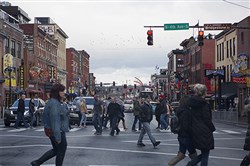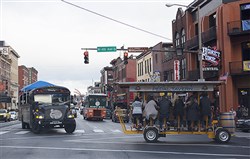VOL. 44 | NO. 5 | Friday, January 31, 2020
Victims of our own success
By Hollie Deese
It’s been nearly 20 years since the Nashville Convention and Visitors Corp. brought together more than 100 community leaders from many industries, including health care, arts and music, to decide the best way to market the city.
They landed on Music City because it was what set Nashville apart from other destinations. So they started promoting “Music City” locally and nationally, organizing press trips outside the city and hosting visiting journalists in an effort to show off the best of the best of Nashville, from music to food to culture.
Things were building, slowly but surely. Then the marketing efforts got a big, prime time boost in 2012 when ABC-TV opted to film the TV show “Nashville” here, spotlighting the city and its music. The show was a hit, airing for six seasons across two networks, racking up ratings and awards as diverse as the Golden Globes, Teen Choice and Emmys.
From there the media attention only grew. And so did Nashville’s profile – and population. The 2010 census set Davidson County’s population at 626,600. The estimated population today is 669,053.
But with all of that acclaim and growth came unintended consequences that Nashville – and its “Music City” identity – is struggling with. Could Nashville’s brand be maintained and continue to thrive?

Lower Broadway has become a magnet for tourists from around the world. It’s also attracted crime, noise and traffic-clogging ‘transportainment’ options including scooters and pedal taverns.
-- Photo By Michelle Morrow |The Ledger“We should be enjoying it and taking advantage of it, not wringing our hands over it,” says Butch Spyridon, president and CEO of the Nashville Convention and Visitors Corp. “But it got left unchecked. Anything left unchecked will turn out bad. Now we’re going to put the checks in place.”
Spyridon has been one of the city’s biggest proponents for bigger, better and more. He is a driving force in the Music City campaign, Nashville’s NFL Draft and growth of the New Year’s Eve and Fourth of July events.
But he knows the spotlight exposes imperfections.
“We absolutely have growing pains. But that should be a good thing,” Spyridon says. “You want to manage growing pains way more than you want to manage a black hole that you have no opportunity out of. So it’s a positive opportunity, but it’s a serious situation.”
Public Safety
Key facts about Nashville’s hospitality industry
• Nashville sold about the same number of hotel rooms last year as Tampa and Philadelphia, and more than New Orleans, San Antonio, Charleston and Austin.
• The number of hotel rooms in Nashville has grown to 33,200, compared to 30,600 last year.
• There are 5,030 hotel rooms under construction with another 9,614 that are in the stages of final planning/planning/prospect with 14,644 rooms in the pipeline.
• 17 new properties with 3,455 rooms are scheduled to open in 2020, including three properties with 446 rooms that have already opened this year. 18 new hotel properties opened in 2019; 15 properties opened in 2018 with nine in 2017 and five in 2016.
• 112 new restaurants/bars/cafes opened in 2019, the third year in a row to exceed 100 openings. Already, 109 have been announced and are expected to open in 2020.
• Nashville International Airport is one of the fastest-growing airports in North America. It served nearly 18.3 million passengers in 2019 on 14 airlines with 540 total daily flights to 75 nonstop destinations.
One growing issue is downtown safety, from sidewalks overtaken by construction crews to a serious strain on police and fire resources.
“First and foremost is public safety, and that goes for locals and visitors alike, not just visitor safety,” Spyridon says. “We have to be most concerned about that.”
Crime is increasing downtown, with the intersection of Third and Broadway recently identified by data from the Metro Nashville Police as one of the most dangerous places in Nashville.
Metro’s police department is short nearly 200 officers, and starting pay – $46,000 a year – is lower than cities such as Cincinnati ($60,000) and Denver ($63,000). So it seems increasing salary might be a good place to start.
Mayor John Cooper, who voted against a property tax increase to increase police pay as a Metro Council member before being elected mayor, says he is committed to finding the money for a boost in salary through better money management. He also has spoken of using money from tourism to help pay for first responders, and Nashville filled last year’s budget gap with a $3.6 million one-time payment from the Convention & Visitor’s Corp.

Tourists love them, but locals despise the party buses, peddle taverns, golf carts, scooters and tour buses that clog downtown streets.
-- Photo By Michelle Morrow |The Ledger“The industry is putting a strain on the city, but the industry is also driving a lot of revenue for the city,” Spyridon continues. “We have got to get that balance right.”
As for disappearing sidewalks, construction crews need a sidewalk encroachment permit to block a sidewalk to do work, and in Davidson County last year 4,000-6,000 permits were issued per month. Permits are only good for 60 days and can be renewed if the crew can prove work still needs to be done.
Hotel overgrowth
There are 33,200 hotel rooms in Davidson County and 47,700 rooms in surrounding counties, statistics provided by Nashville Convention and Visitor’s Corp. area reveal.
Twenty hotels opened in the greater Nashville area in 2015-2016. There were another nine in 2017. There were 15 more in 2018, and 18 with 2,483 rooms last year.
This year there are 17 properties with 3,455 rooms scheduled to open. Of those, two properties with 446 rooms have already opened.
Janet Kurtz owns Kurtz Hospitality Marketing, a company that helps businesses in the hospitality industry with marketing, PR and social media, so she closely watches the hotel industry growth in the area.
“As growth has continued in Nashville, what has been surprising is the degree of sustainability we have seen in the hotels and restaurant business,” says Kurtz, who was on staff at the Hermitage Hotel for 13 years before starting her own firm in 2016.
“While many question the volume of hotels under construction, we have seen business continue to grow and change. Boutique hotels and hybrid hotels followed the national pattern of expansion into the market where large brands had previously dominated.”
And while her livelihood depends on hotels, the sheer volume of openings has made her job more difficult. She says she tries to help her clients rise above the din by creating a long, soft marketing plan to spread the word from construction through opening.
“Hotels and restaurants now have the greater challenge of promoting their properties over the many other properties that are opening in the market,” Kurtz explains. “These companies now must navigate a nimble dance of introduction to the local market, as well as launch of their property on a national and international scale.”
Ultimately, tourism and residents have to get along, and that becomes harder the more hotels are popping up in neighborhoods outside the downtown core, such as in East Nashville and Music Row.
Where there’s money …
Aggressive panhandling has Spyridon concerned. It’s an issue that has been growing as the city’s tourism and homeless numbers have increased.
“It’s a growing problem,” Spyridon says.
In Tennessee, aggressive panhandling is described as intentionally touching someone without their consent, obstructing the path of a person or vehicle, following a person from whom they are soliciting a donation or threatening a person with violence or intimidation for refusing the solicitation of a donation.
A bill introduced by Metro Council member Freddie O’Connell last year targeted panhandling on parts of Second Avenue North, Commerce Street, Symphony Place and the John Seigenthaler Pedestrian Bridge. It passed on first reading but was ultimately withdrawn.
“We have reached the point now that the mayor’s office is willing to convene some folks, sit down, confirm the issues, prioritize in terms of those most important to address and then come up with short-term and long-term strategies,” Spyridon says.
Addressing homelessness is a priority.
“That will involve raising some money, probably from the private sector,” Spyridon adds. “But I feel we have pretty good consent on the issues, and we have great support from the Cooper administration to begin to get our arms around it. Not a quick fix, but there are some things we can probably do sooner than later.”
Too much trash
Metro Public Works reports that Nashville generated 106,100 more tons of trash in 2018 (968,746) than in 2017 (862,640).
In fact, the area’s fast growth forced Public Works last year to switch apartment complexes with five or more units to dumpster service rather than curbside.
And Murfreesboro’s Middle Point landfill, which takes in 4,000 tons of trash a day, is expected to be full in less than eight years. Other nearby landfills – Bi-County in Montgomery County, the Rutherford County landfill and Smith County Landfill – are getting close to capacity.
Waste directors from 13 counties are working on the first solid waste management plan for the region as a way to educate about recycling, composting and waste diversion. The Tennessee Department of Environment and Conservation uses grants to support diversion programs.
‘Transportainment’
Scooters, pedal taverns, party buses and tractors hauling wagonloads of tourists are prime examples of the unintended consequences of unchecked regulations.
When scooters first came to Nashville, many companies entered the market at once with no regulations, littering sidewalks and streets with abandoned scooters and causing injuries among the uninitiated.
After 26-year-old pedestrian Brady Gaulke died following a collision with an SUV while on a scooter in June, then-mayor David Briley proposed banning scooters. Metro Council voted 29-1 to allow them to return to downtown streets.
In July, Metro Council passed new legislation that mandated scooter companies cut their fleet sizes in half and limit operating hours. Metro officials are set to reduce the number of scooter companies operating in Nashville to a maximum of three but have not yet decided which three.
Still, Gotcha Mobility removed their scooter fleet from Nashville in August. Lyft ended its Nashville scooters in November.
The three providers ultimately chosen would pay an application fee of $500 per company and be fined $25 per each abandoned scooter. Scooters couldn’t be used after 10 p.m. on weekdays or after 11 p.m. on weekends.
Pedal Taverns, golf cart tour vehicles and other entertainment vehicles are also causing traffic issues downtown, and anyone who has been stuck in their car behind one as it takes two to three lights to make it through an intersection would probably say they have no business being on the road with actual motorized cars.
Pedal taverns first showed up in Music City in 2010. Today, the city allows 56 pedal taverns from three companies.
In 2016 the city restricted them and other slow-moving vehicles from operating between 7-9:30 a.m. and 4-6:30 p.m.
“I absolutely think there is a balance that can and should be met,’’ Spyridon says of dealing with these unintended consequences downtown. “I think everybody would admit it’s been left uncontrolled and it’s a bit like the Wild West.
“It’s not good for anybody. I’m confident that we can address it, and I’m confident we can get our arms around it, because the alternative terms of either blowing it up intentionally or imploding unintentionally are not positive outcomes for Metro.
“It’s a loss of tax revenue. It’s a loss of jobs. It’s a black eye on the PR end of things.”